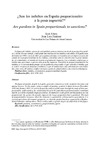Please use this identifier to cite or link to this item:
https://accedacris.ulpgc.es/jspui/handle/10553/70655
| DC Field | Value | Language |
|---|---|---|
| dc.contributor.author | Abreu Alemán, José | en_US |
| dc.contributor.author | Jiménez González, Juan Luis | en_US |
| dc.date.accessioned | 2020-03-05T09:25:18Z | - |
| dc.date.available | 2020-03-05T09:25:18Z | - |
| dc.date.issued | 2019 | en_US |
| dc.identifier.issn | 0210-2633 | en_US |
| dc.identifier.uri | https://accedacris.ulpgc.es/handle/10553/70655 | - |
| dc.description.abstract | La figura del indulto, a pesar de su legalidad, genera controversia desde la perspectiva jurídi-ca y social. En este trabajo, y utilizando una muestra de los indultos concedidos en España entre diciembre de 1995 y enero de 2013, perseguimos ahondar en el análisis de este tópico a través del estudio de la proporcionalidad de los indultos, entendida como la relación entre la pena indulta-da y/o conmutada y el tamaño de la pena originalmente impuesta. Los resultados señalan que se indulta más porcentaje a quienes más pena fue impuesta. Esta falta de proporcionalidad de los indultos se ve incrementada porque sea un gobierno conservador el que conceda el indulto; que se realice en época de bonanza económica; o que el indulto haya sido solicitado por una Cofra-día, entre otros. El análisis confiere un mayor grado de subjetividad a esta controvertida figura.Palabras clave: indultos, econometría, proporcionalidad, España | en_US |
| dc.description.abstract | The figure of pardon, despite its legality, generates controversy in the academic literature and among lawyers. In this paper, using a sample of pardons granted in Spain between December 1995 and January 2013, we seek to deepen the analysis of this topic through the study of their pro-portionality, understood as the relationship between the punishment pardoned and/or commuted and the size of the originally imposed sentence. Econometric results point out that pardons are not proportional: the greater the penalty imposed, the larger proportion that is pardoned. This lack of proportionality increases when the clemency is granted by a Conservative government; it is carried out in times of economic prosperity; or when the pardon has been requested by a Brother-hood (Cofradía), among others. These results confer a greater degree of subjectivity to this figure.Keywords: pardons, econometrics, proportionality, Spain. | en_US |
| dc.language | spa | en_US |
| dc.relation.ispartof | Cuadernos económicos de ICE | en_US |
| dc.source | Cuadernos económicos de ICE [ISSN 0210-2633], n. 97, p. 217-233 | en_US |
| dc.subject | 590502 Comportamiento político | en_US |
| dc.subject | 56 Ciencias jurídicas y derecho | en_US |
| dc.subject | 5905 Vida política | en_US |
| dc.subject.other | Indultos | en_US |
| dc.subject.other | Econometría | en_US |
| dc.subject.other | Proporcionalidad | en_US |
| dc.subject.other | España | en_US |
| dc.subject.other | Pardons | en_US |
| dc.subject.other | Econometrics | en_US |
| dc.subject.other | Proportionality | en_US |
| dc.subject.other | Spain | en_US |
| dc.title | ¿Son los indultos en España proporcionales a la pena impuesta? | en_US |
| dc.title.alternative | Are pardons in Spain proportionals to sanctions? | en_US |
| dc.type | info:eu-repo/semantics/article | en_US |
| dc.type | Article | en_US |
| dc.identifier.doi | 10.32796/cice.2019.97.6803 | en_US |
| dc.investigacion | Ciencias Sociales y Jurídicas | en_US |
| dc.type2 | Artículo | en_US |
| dc.utils.revision | Sí | en_US |
| dc.identifier.ulpgc | Sí | en_US |
| dc.description.dialnetimpact | 0,0 | |
| dc.description.dialnetq | Q3 | |
| dc.description.dialnetd | D7 | |
| item.fulltext | Con texto completo | - |
| item.grantfulltext | open | - |
| crisitem.author.dept | GIR Análisis de Políticas Públicas | - |
| crisitem.author.dept | Departamento de Análisis Económico Aplicado | - |
| crisitem.author.orcid | 0000-0002-3808-2588 | - |
| crisitem.author.parentorg | Departamento de Análisis Económico Aplicado | - |
| crisitem.author.fullName | Abreu Alemán, José | - |
| crisitem.author.fullName | Jiménez González, Juan Luis | - |
| Appears in Collections: | Artículos | |
Page view(s) 5
325
checked on Jan 15, 2026
Download(s)
312
checked on Jan 15, 2026
Google ScholarTM
Check
Altmetric
Share
Export metadata
Items in accedaCRIS are protected by copyright, with all rights reserved, unless otherwise indicated.
